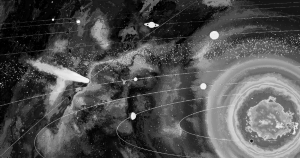
Astrological transit is the technical term for the physical movement of the planets in the sky both in relation to the location they were at your birth (personal transits) and with each other (collective transits).
The planets are always ‘transiting’ as they are always moving. Personal transits are all in relation to your birth chart and will help you understand how each planet’s movement lights up different areas of your life. Collective transits are what astrologers use to forecast and predict the overall influence of a transit here on Earth.
There are different types of transit, different labels which represent the exact placement in terms of degrees. For example, transiting Jupiter (planet of abundance and luck) might conjunct (be at the same sign and degree as) your career zone and around this time out of nowhere you might be offered the role of a lifetime or make a breakthrough leading to big rewards.
The impact of the ‘inner planets’ (the Moon, Sun, Mercury, Venus, and Mars) transits is relatively fast as their orbits are shorter, being nearest the Sun.
However, the further away, slow-moving ‘outer planets’ like Jupiter, Saturn, Uranus, Neptune, or Pluto represent a much slower, steadier, deeper shift in energy or influence.
Aspect is another term used in this discipline. It basically means a transit which brings two planets together; Uranus square Pluto, Venus opposite Mars. Aspects are like astrological weather and help astrologers predict what will happen at that time. It’s like the planets are taking on different traits and powers as they move through the different zodiac signs in the sky and the aspects are them in conversation with each other, creating new tensions and energies.

It is complicated, and takes many years of learning and practice to get your head around it all, but it is very interesting too.
So, what are the different types of transit?
Ingress
This term is used when a planet moves into a new house sign or house, for example, Mercury is making an ingress (or has ingressed) into Virgo.
Conjunction
When the planets are very close together, basically almost at the same space in the sky (and usually in the same sign), and therefore their energies are merged.
The Sun and Moon do this every month at New Moon which often sparks a new beginning.
Sextile
As the planets move apart again they’ll reconvene in the next aspect called a sextile. This is when they are 60 degrees apart, or two zodiac signs. This means those two planets will always fall in compatible astrological elements, such as fire and air or water and earth.
This is a ‘nice’ aspect, or transit, and brings those planet’s energies together to create something, manifest a positive step, make a good change.
Square
The planets continue to move further away from each other and now enter an aspect called a square. They are 90 degrees, and three zodiac signs, apart.
This is a conflict position, a direct opposition of their energies. There might be tension or drama, but if you can recognise it and adjust to it, then it will make you stronger. Hardships always do, right?
Trine
The planets’ trajectory continues and this aspect means they are now 120 degrees, and four zodiac signs, apart.
This is the best aspect in terms of the planets resonating with each other and generating positive vibes. Good fortune, blessings, opportunities and advancements are all in abundance here.
Opposition
This is the most intense aspect and occurs when the two planets in question are exactly opposite each other across the sky, 180 degrees apart.
It is a meeting of two opposing forces and influences and there will likely be struggle and conflict leading to a new way of doing things. Change often comes from chaos or discomfort.
Kerry King, the tarot queen, uses tarot and star sign wisdom to create inspiring forecasts and insights, with over 25 years fortune telling experience, and many happy clients all over the world. You can book a personal, written reading, which comes as a beautifully illustrated brochure, through Etsy or join her new Tarot Club and get weekly forecasts and more for £5 a month.
Your daily Metro.co.uk horoscope is here every morning, seven days a week (yes, including weekends!). To check your forecast, head to our dedicated horoscopes page.
Do you have a story to share?
Get in touch by emailing [email protected].
Source: Read Full Article



